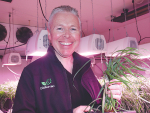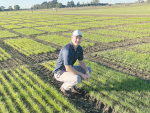For the first time in FAR trials ryegrass seed yields have topped 4t/ha.
The stellar result was announced among a smorgasbord of agronomy messages presented by the levy-funded cropping body at a series of grower meetings earlier this month.
“This is the first time we’ve ever achieved 4000kg/ha,” FAR’s Richard Chynoweth told an Autumn Results Round-Up meeting in Timaru. “We’re pretty rapt with that.”
The breakthrough came in plant growth regulator trials on a Bealey-like coded cultivar at an irrigated site east of Ashburton using 2L/ha of yet-to-be-approved product Payback (paclobutrazol) with trinexapac-ethyl (TE – as in Moddus) and Cycocel (chlormequat chloride) at growth stage 31.
Payback is currently used as a fruit-thinning tool in apple orchards and at about $500/L is probably too expensive to be commercially viable for herbage seed growers at present, even if it were registered.
“It did not produce the highest margin,” noted Chynoweth. However, he later told Rural News he knows there are companies keen to get it registered for use in ryegrass which could see the price come down. “It’s long gone off patent.”
Yields from a South Canterbury trial are still to be finalised but they look equally promising, Chynoweth added.
Like the other growth regulators, Payback is a gibberellin-blocker, but appears to be taken up through roots rather than leaves. Consequently sprays must penetrate crop canopy to the soil to be effective, explained Chynoweth.
The soil uptake also seems to make the product effective for longer, so late growth stage 33 (GS33) pgrs are less likely to be needed.
Chynoweth stressed that because the product’s not registered for use in grass seed crops, at present the result is more of scientific interest than for commercial application at this stage but it seems that could change.
Of the other sequences of pgrs a three spray programme of 0.8L/ha TE + 2L/ha CCC at GS31 and GS32 followed by 0.8L/ha TE at GS33 was the next highest yielding, both where plots were topped and closed (November 4) and where there was no topping, coming in at 3758kg/ha and 3737kg/ha respectively.
Statistically those yields were significantly better than all other treatments in the non-topped plots, despite the trial’s least significant difference of 351kg. However, in the topped plots a three-spray programme of 0.8L/ha TE and a two spray sequence of 1.4L/ha TE at GS31 and 1.0L/ha TE at GS32 were statistically on par at 3574kg/ha and 3488kg/ha respectively. The Payback treatment wasn’t used in the topped plots.
Height a new tool?
Presenting the ryegrass pgr work (see main story) Chynoweth suggested measuring crop height as an assay of pgr efficacy and likely yield. “The idea is we could use stem length as a potential yield indicator.”
Data from many trials shows a strong negative correlation between crop height and yield with a ‘sweetspot’ for ryegrass at about 60cm, he explained.
“It might be a damn sight easier than estimating lodging out in the field to see if you got it right.”
For Italian ryegrass the target would be about 65cm and cocksfoots and fescues 75cm, he suggested.
But as one drought-struck dryland grower wryly pointed out, crops can be too short. “My turf grasses were 25cm this year and they definitely didn’t achieve 4t/ha!”



















